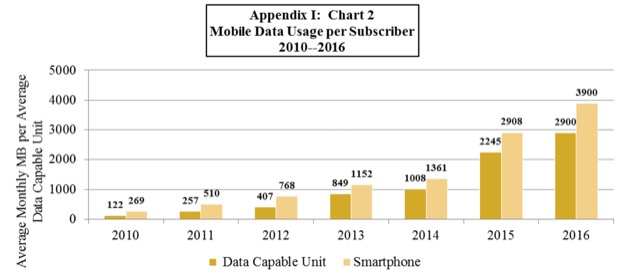The U.S. mobile broadband market is competitve, says FCC

The Federal Communications Commission has made a case for declaring that the mobile broadband market in the U.S. is broadly competitive, in a qualitative, preponderance of the evidence sort of way. Looking at a number of different metrics, including usage (see chart above), pricing, advertising, investment coverage, the FCC decided that when it was all added up, the result was “there is effective competition in the marketplace for mobile wireless services”.
One key indicator – half statistical, half anecdote – was the way the four major nationwide carriers responded to each other when unlimited data plans were reintroduced…
… MoreOne significant trend that has developed recently is the return of “unlimited” data plans.

![Mark Miller [CC BY-SA 3.0 (https://creativecommons.org/licenses/by-sa/3.0)], via Wikimedia Commons](https://www.tellusventure.com/images/2017/10/jerry_brown_rally.jpg)
![By raduranga (Own work) [CC BY-SA 4.0 (https://creativecommons.org/licenses/by-sa/4.0)], via Wikimedia Commons](https://www.tellusventure.com/images/2017/9/san_francisco_sunrise.jpg)


![Noah_Loverbear [CC BY-SA 3.0 (https://creativecommons.org/licenses/by-sa/3.0)], via Wikimedia Commons](https://www.tellusventure.com/images/2017/9/americas_cup_alcatraz.jpg)



![By No machine-readable author provided. Ricadito~commonswiki assumed (based on copyright claims). [GFDL (https://www.gnu.org/copyleft/fdl.html) or CC-BY-SA-3.0 (https://creativecommons.org/licenses/by-sa/3.0/)], via Wikimedia Commons](https://www.tellusventure.com/images/2017/9/amazon_village.jpg)